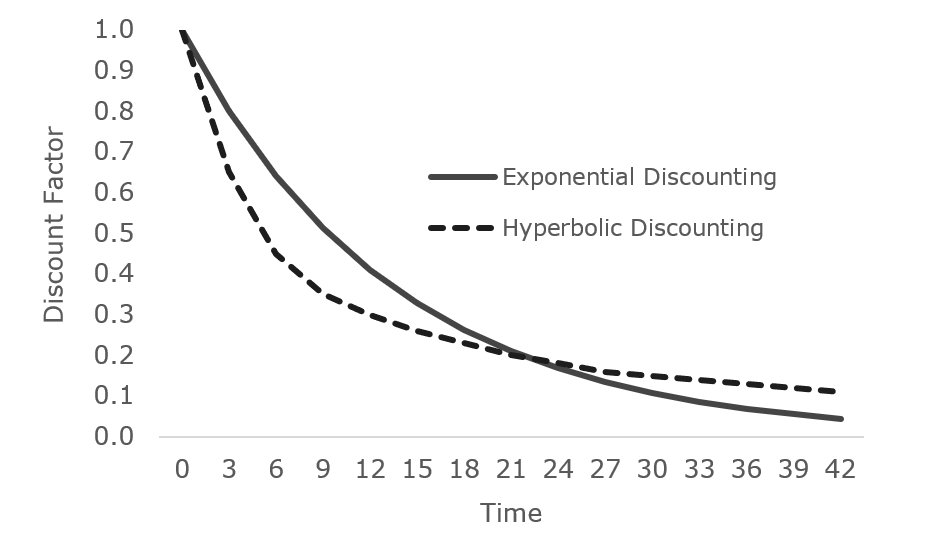Introduction
In the complex landscape of decision-making, understanding the mental models that shape our choices is crucial. One such model is Hyperbolic Discounts, which refers to our tendency to prefer immediate rewards over larger but delayed rewards. Anchored in human psychology, this mental model sheds light on our susceptibility to impulsivity and how it impacts our decision-making processes. Hyperbolic Discounts are prevalent in our day-to-day lives and can lead to irrational decisions contrary to our best interests. In this blog post, we will delve into the concept of Hyperbolic Discounts, explore its occurrence in various contexts, analyze the biases that contribute to it, provide practical strategies to mitigate its influence, and underscore the value of awareness and active avoidance of this mental trap.
Understanding Hyperbolic Discounts
Hyperbolic Discounts represent our inclination to place a higher value on immediate rewards while discounting the value of delayed rewards. It is a form of temporal discounting where the subjective value of a future reward decreases exponentially with the delay in receiving it. This bias reflects our preference for instant gratification over potentially greater benefits that require patience and delayed gratification.
The Relevance of Hyperbolic Discounts in Decision-Making
Hyperbolic Discounts have profound implications for decision-making processes across various domains, including personal life decisions, business scenarios, and public policy-making. By succumbing to the allure of immediate rewards, individuals and groups can make irrational choices that contradict their long-term best interests.
Examples of Hyperbolic Discounts in Various Contexts
- Personal Life Decisions: Consider the decision to maintain a healthy lifestyle. A person may struggle to resist the temptation of unhealthy foods or to adopt an exercise routine due to the immediate pleasure of indulgence or the discomfort of physical exertion. By prioritizing immediate gratification over long-term health benefits, individuals may compromise their well-being and overall quality of life.
- Business Scenarios: Hyperbolic Discounts can affect businesses in areas such as investment decisions and financial planning. For instance, a company may choose short-term cost-cutting measures instead of making investments in research and development or employee training. While this decision may yield immediate savings, it can hinder the company’s long-term growth and competitive advantage.
- Public Policy-Making: In the realm of public policy, Hyperbolic Discounts can influence decisions related to environmental conservation or infrastructure development. Policymakers may prioritize short-term economic gains over long-term sustainability or invest in quick-fix solutions rather than addressing underlying systemic issues. Such decisions can have far-reaching consequences for society and future generations.
Mental Biases and Psychological Underpinnings
Hyperbolic Discounts are driven by several cognitive biases and psychological factors. Some of the biases that contribute to this mental trap include:
- Present Bias: Present bias leads us to prioritize immediate rewards over future gains. We tend to place more weight on immediate experiences and find it challenging to fully appreciate the benefits of delayed rewards.
- Loss Aversion: Loss aversion is our tendency to weigh potential losses more heavily than equivalent gains. In the context of Hyperbolic Discounts, individuals may prefer immediate rewards to avoid the perceived loss of waiting or uncertainty associated with delayed rewards.
- Optimism Bias: The optimism bias causes us to underestimate the challenges or delays involved in achieving long-term goals. We may have an overly optimistic outlook, leading us to undervalue future rewards and prioritize immediate gratification.
Mitigation Strategies for Hyperbolic Discounts
While Hyperbolic Discounts may seem challenging to overcome, several strategies can help mitigate their influence:
- Goal Setting and Planning: Clearly define your long-term goals and break them down into smaller, actionable steps. By setting milestones and tracking progress, you can maintain focus on the larger objective and reduce the allure of immediate rewards.
- Delayed Gratification Techniques: Practice delaying gratification in small ways. Start by consciously delaying small rewards and gradually increase the duration. This exercise helps build self-control and reduces the impulsivity associated with Hyperbolic Discounts.
- External Accountability: Seek external sources of accountability, such as sharing your goals with a trusted friend or joining a support group. The presence of others can help you stay motivated and committed to long-term rewards, even in the face of immediate temptations.
- Mindfulness and Self-Awareness: Cultivate mindfulness to develop a greater awareness of your thoughts, emotions, and impulses. By recognizing the onset of Hyperbolic Discounts, you can pause and evaluate the long-term consequences before making impulsive decisions.
Conclusion
Hyperbolic Discounts represent a significant cognitive bias that can derail our decision-making processes by prioritizing immediate rewards over delayed but potentially greater benefits. By understanding the underlying psychological factors and biases that contribute to this bias, we can develop strategies to mitigate its influence. Awareness, goal setting, delayed gratification techniques, and mindfulness play crucial roles in avoiding the pitfalls of Hyperbolic Discounts. By making more objective and informed choices, we can align our decisions with our long-term goals and overall well-being. Remember, overcoming this mental trap requires conscious effort and a willingness to prioritize the future over the allure of immediate rewards.
